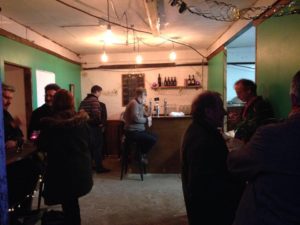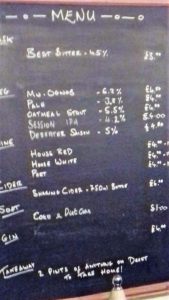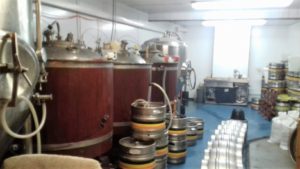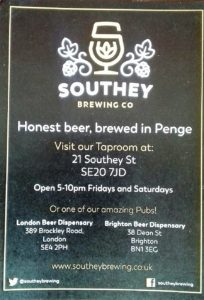No, not pictures of Ken Clarke (British politician) looking the worse for wear at Ronnie Scott’s, but an interesting bit of etymology.
 On Friday last I was out in south London and was taken to a Tap Room. Now I remember these from my youth, in old-fashioned country pubs where beer was served, often straight from the barrel i.e. via the barrel ‘tap’. They also existed as attachments to breweries where one could drink the latest brew, including the experiments by the brewers, only some of which made it to full retail. More recent incarnations of the title, however, see it attached to bars which have nothing to do with small breweries or rural ways but use the old name as a way of co-opting some sort of authenticity to modern, more plastic establishments.
On Friday last I was out in south London and was taken to a Tap Room. Now I remember these from my youth, in old-fashioned country pubs where beer was served, often straight from the barrel i.e. via the barrel ‘tap’. They also existed as attachments to breweries where one could drink the latest brew, including the experiments by the brewers, only some of which made it to full retail. More recent incarnations of the title, however, see it attached to bars which have nothing to do with small breweries or rural ways but use the old name as a way of co-opting some sort of authenticity to modern, more plastic establishments.
 The Tap Room which I visited was of the genuine, brewery kind. Just a small room off the micro-brewery itself, the only indicator that it existed at all was an A-frame sign saying ‘BEER’ with an arrow pointing up an alleyway. Inside was a counter and a couple of tables and some high stools. The names of the beers were inscribed on a chalkboard on the wall, together with percentage alcohol content. The strongest, Mu Og-Nob, was at 6.2% too strong for me, though it had a fantastic fruity taste.
The Tap Room which I visited was of the genuine, brewery kind. Just a small room off the micro-brewery itself, the only indicator that it existed at all was an A-frame sign saying ‘BEER’ with an arrow pointing up an alleyway. Inside was a counter and a couple of tables and some high stools. The names of the beers were inscribed on a chalkboard on the wall, together with percentage alcohol content. The strongest, Mu Og-Nob, was at 6.2% too strong for me, though it had a fantastic fruity taste.
Dom the barman, from Clapham as it happens, was helpful, friendly and  informative. The brewer’s father, although not the brewer himself, was there, happy to chat about his son’s produce. A south Londoner by birth who had worked in the City all his life, he made no claim to instilling a love of brewing in his son, though was happy to acknowledge an inherited love of beer. The brew was very good indeed, even if the general conditions were spartan.
informative. The brewer’s father, although not the brewer himself, was there, happy to chat about his son’s produce. A south Londoner by birth who had worked in the City all his life, he made no claim to instilling a love of brewing in his son, though was happy to acknowledge an inherited love of beer. The brew was very good indeed, even if the general conditions were spartan.
It was, I said, a real ‘boozing ken’, a phrase my companions hadn’t come across before. I knew it was old, probably Tudor, but this prompted me to discover its etymology. It means a place where alcoholic drink is taken, but has low life connotations, probably because ken, meaning house, was a place where disreputable characters would meet ( 1560s ) ken being thought to be a shortened form of the noun kennel. The verb to booze probably comes from the Middle English bouse (c.1300) which is related to the Middle Dutch busen, meaning to drink. By the mid-18th century it meant to drink a lot and was one of Benjamin Franklin’s 225 synonyms for ‘drunk’ published in 1737¹.
One could certainly get drunk in a very pleasant way in the Southey  Brewery’s Tap Room, as one could in their pubs in Brockley and Brighton. The brewery is so called because it is located on Southey Street, a small, mainly residential road named for the poet and biographer Robert Southey, who was Poet Laureate in the early 19th Century. I suggested that they make a Laureate Ale, though Southey himself was born on Wine Street and, for all his scholarly erudition is probably best known for the nursery rhyme ‘What Are Little Boys Made of?’ and The Story of the Three Bears (the original Goldilocks story).
Brewery’s Tap Room, as one could in their pubs in Brockley and Brighton. The brewery is so called because it is located on Southey Street, a small, mainly residential road named for the poet and biographer Robert Southey, who was Poet Laureate in the early 19th Century. I suggested that they make a Laureate Ale, though Southey himself was born on Wine Street and, for all his scholarly erudition is probably best known for the nursery rhyme ‘What Are Little Boys Made of?’ and The Story of the Three Bears (the original Goldilocks story).
On Friday night we didn’t see any bears, but a local fox looked in, before hurrying away about its business. The Tap Room is open, as the poster, above states, on Friday and Saturday nights from 5 p.m.. The beer is first rate. N.B. My only connection with Southey is as a, one-time so far, consumer.
¹The Drinkers Dictionary, article in The Pennsylvania Gazette.
If you enjoyed reading this article you might like others about language like What’s in a Name How does a book sound? The Demagogue’s Dictionary Parlez Vous Bike?


 RSS – Posts
RSS – Posts
One response to “Boozing Kens”